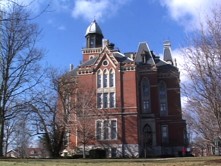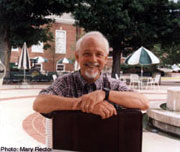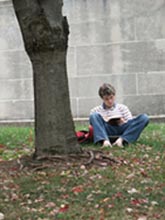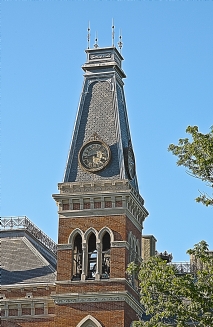11 Nationally Distinguished Scholars to Examine 'Political Education and the Modern University,' April 7-12
January 6, 2003
Visit Special Symposium Web Site
 January 6, 2003, Greencastle, Ind. - In an era of historically low voter turnout, and with concerns that college students are disengaged from the democratic process, what is the role and influence of the university in American political life? That question and others will be addressed by some of the nation's most prominent scholars and thinkers at a week-long symposium, “Political Education and the Modern University,” to take place April 7-12, 2003 on the campus of DePauw University.
January 6, 2003, Greencastle, Ind. - In an era of historically low voter turnout, and with concerns that college students are disengaged from the democratic process, what is the role and influence of the university in American political life? That question and others will be addressed by some of the nation's most prominent scholars and thinkers at a week-long symposium, “Political Education and the Modern University,” to take place April 7-12, 2003 on the campus of DePauw University.
Supported by a grant from the Mellon Foundation, the symposium will bring 11 nationally distinguished scholars to DePauw, including historian and civil rights leader Roger Wilkins; Pulitzer Prize-winning investigative reporter and best-selling author James B. Stewart; and keynote speaker Michael J. Sandel, Professor of Government at Harvard University and one of the most prominent thinkers of our time.
![]() [DOWNLOAD VIDEO: "Institutions and the 'Civic Self'" 872KB] "We, in our society, have never really had a coherent conception of the role of institutions in the shaping of what you could call 'the civic self' – the making of citizens in a democratic republic," says Robert E. Calvert (seen at right), Professor of Political Science at DePauw and
[DOWNLOAD VIDEO: "Institutions and the 'Civic Self'" 872KB] "We, in our society, have never really had a coherent conception of the role of institutions in the shaping of what you could call 'the civic self' – the making of citizens in a democratic republic," says Robert E. Calvert (seen at right), Professor of Political Science at DePauw and  coordinator of the symposium. "Until recently we've all more or less assumed that good citizens would always be there, and that nobody really had to make any conscious effort to make that happen."
coordinator of the symposium. "Until recently we've all more or less assumed that good citizens would always be there, and that nobody really had to make any conscious effort to make that happen."
The seeds for “Political Education and the Modern University” can be traced to a statement issued in July 1999 by Campus Compact billed as the "Presidents' Fourth of July Declaration on the Civic Responsibility of Higher Education."Responding to concern about “the disengagement of college students from democratic participation,” the statement challenged higher education to “reexamine its public purposes and its commitments to the democratic ideal.” DePauw President Robert G. Bottoms, with a grant from the Mellon Foundation, responded by inaugurating a series of faculty discussions  on religion, leadership, and civic responsibility to probe the opportunities and implications of the Campus Compact challenge. Those discussions were wrapping up just as September 11, 2001 and its aftermath heightened national interest in such issues and formed the basis for DePauw's decision to initiate this unusual, major symposium.
on religion, leadership, and civic responsibility to probe the opportunities and implications of the Campus Compact challenge. Those discussions were wrapping up just as September 11, 2001 and its aftermath heightened national interest in such issues and formed the basis for DePauw's decision to initiate this unusual, major symposium.
![]() [DOWNLOAD AUDIO: "Bringing to the Surface" 652KB] "The events of 9/11-– the huge blow to American consciousness it presented, the upsurge in various displays of patriotism, some of them troubling, coupled with some harsh criticism from within universities of America's role in the world and of the kind of society we were generally-– all focused our attention on what it means to be a citizen of this country in ways that before had always lurked beneath the surface but were now brought forcefully to the surface," Dr. Calvert says.
[DOWNLOAD AUDIO: "Bringing to the Surface" 652KB] "The events of 9/11-– the huge blow to American consciousness it presented, the upsurge in various displays of patriotism, some of them troubling, coupled with some harsh criticism from within universities of America's role in the world and of the kind of society we were generally-– all focused our attention on what it means to be a citizen of this country in ways that before had always lurked beneath the surface but were now brought forcefully to the surface," Dr. Calvert says.
Over the symposium's six days, the panel of distinguished scholars will grapple with a wide range of difficult but important questions. For example, can  universities engage in character education without abandoning the principle of value neutrality central to the disinterested search for truth? Is there a role for religion in support of a secular republic? Do the mass media help or hinder the processes of democracy? If universities reflect the religious, racial, ethnic, and ideological diversity of the larger society, can they also teach the values of a common citizenship? As universities become more and more devoted to serving the private career aspirations of their students, can they also teach those same students to be the public-spirited citizens that a democratic republic requires? Is such a “political” education compatible with the obligations we Americans have to humanity as such in an increasingly interdependent world?
universities engage in character education without abandoning the principle of value neutrality central to the disinterested search for truth? Is there a role for religion in support of a secular republic? Do the mass media help or hinder the processes of democracy? If universities reflect the religious, racial, ethnic, and ideological diversity of the larger society, can they also teach the values of a common citizenship? As universities become more and more devoted to serving the private career aspirations of their students, can they also teach those same students to be the public-spirited citizens that a democratic republic requires? Is such a “political” education compatible with the obligations we Americans have to humanity as such in an increasingly interdependent world?
The symposium's format will include a public lecture by each guest, followed by a seminar with faculty and students, as well as a panel discussion each day, also open to the public.
panel discussion each day, also open to the public.
The speakers not only have produced an outstanding body of scholarly work while teaching generations of undergraduates, but they also have participated in the polity and civil society about which they write. They have advised presidents, worked as public servants, testified before Congress, helped other nations draft constitutions, won Pulitzer Prizes, led antiwar protests, chaired faculty committees on moral reasoning in the curriculum, and guided their professional organizations. They include:
- Benjamin R. Barber, Gershon and Carol Kekst Professor of Civil Society and Wilson H. Elkins Professor, University of Maryland School of Public Affairs and the College of Behavioral and Social Sciences
- Jean Bethke Elshtain, Laura Spelman Rockefeller Professor of Social and Political Ethics, University of Chicago
- Todd Gitlin, Professor of Journalism and Sociology, Columbia University
- Stephen Holmes, Professor of Law at New York University
- Leroy Rouner, Professor of Philosophy, Religion and Philosophical Theology; director of the Institute for Philosophy and Religion,
 Boston University
Boston University - Michael J. Sandel, Professor of Government, Harvard University
- James B. Stewart '73, Editor-at-large, SmartMoney magazine; Adjunct Professor in the Graduate School of Journalism, Columbia University
- Cass R. Sunstein: Karl N. Llewellyn Distinguished Service Professor of Jurisprudence, University of Chicago Law School
- Michael Walzer, Professor of Social Science, Institute for Advanced Study, Princeton, NJ
- Roger Wilkins, Clarence J. Robinson Professor of History and American Culture, George Mason University
- Alan Wolfe, Professor of Political Science; Director of the Boisi Center for Religion and American Public Life, Boston College
All the symposium lectures and panel discussions are open to the public and are presented free of charge. For more information on “Political Education and the Modern University" contact Robert Calvert by clicking here.
